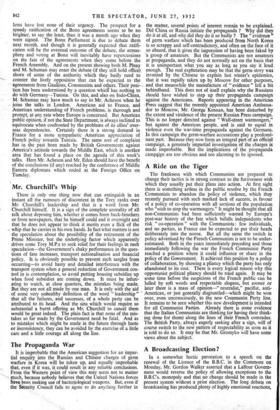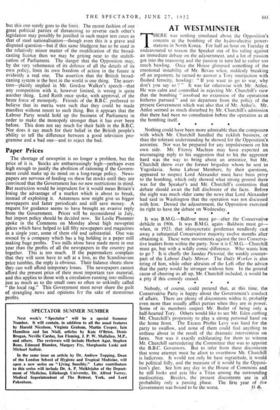A Broadcasting Election?
In a somewhat hectic peroration to a speech on the renewal of the Licence of the B.B.C. in the Commons on Monday, Mr. Gordon Walker asserted that a Labour Govern- ment would reverse the policy of allowing exceptions to the B.B.C's. monopoly and that no change should be made in the present system without -a prior election. The long debate on -broadcasting his produced plenty of highly emotional reactions, but this one surely goes to the limit.• The recent fashion of our great political parties of threatening to reverse each other's legislation may possibly be justified in such major test cases as that of steel- nationalisation—though even this is a grave and disputed question—but if this same bludgeon has to be used in the relatively minor matter of the modification of the broad- casting licence then we may be getting near to the stultifi- cation of Parliament. The danger that the Opposition may, by the very vehemence of its defence of all the details of its own policy, limit its own freedom of action in the future is evidently a real one. The assertion that the British broad- casting system is the best in the world is one thing. The asser- tion—plainly implied in Mr. Gordon Walker's speech—that any competition with it, however limited, is wrong is quite another thing. Lord Reith once spoke, with approval, of the brute force of monopoly. Friends of the B.B.C. preferred to believe that its merits were such that they could be made manifest without resort to such thing. But it appears that the Labour Party would hold up the business of Parliament in order to make the monopoly stronger than it has ever been before. This does not say much for their faith in the B.B.C. Nor. does it say much for their belief in the British people's ability to tell the difference between a good television pro- gramme and a bad one—and to reject the bad.



































 Previous page
Previous page